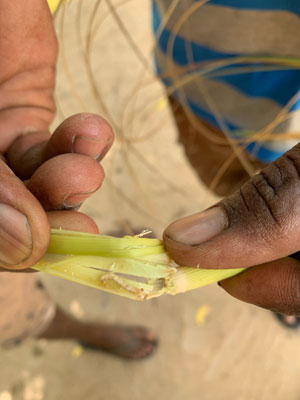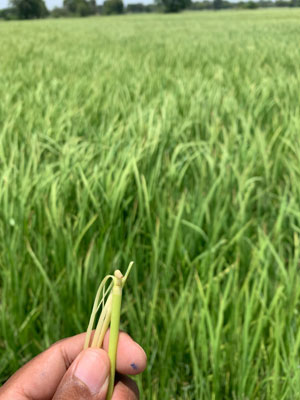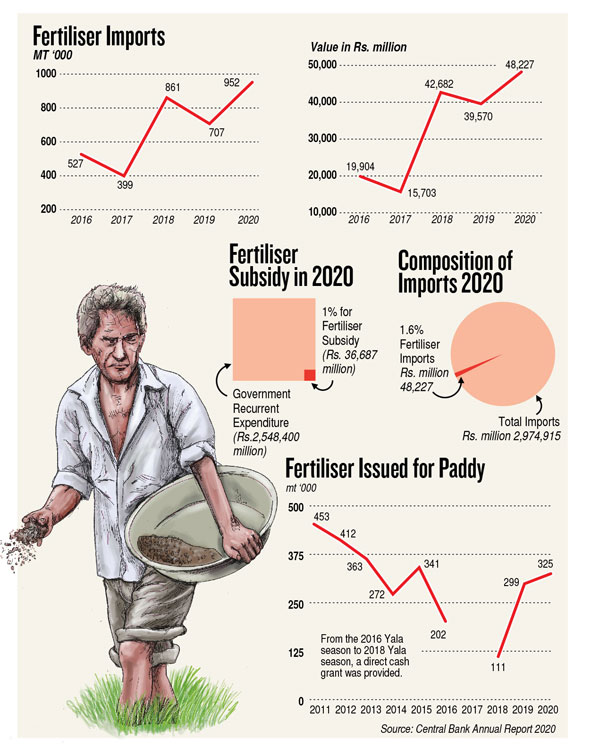News
Farmers left high and dry with no fertiliser, organic or chemical
By mid-July of every Yala season, Karthikesu Kandasamy (69) from Murasumottai, Kilinochchi would begin harvesting his paddy cultivation of three acres. As a farmer who spent over three decades of his life farming paddy, the sudden announcement by the government to ban the use of chemical fertilisers and agro-chemicals came as a shock to him.
Two weeks back, Kandasamy found white patches on the leaves of seedling paddy crops in some plots of the paddy field. They were infected with stem borers – a common enemy of farmers, caused by an insect that prevents crops from growth.

Farmers point out how 'stem borers' have attacked their crops
Once infected, the crop’s leaves will have white patches. The insect damages the young crop by causing it to dry out panicles, and no grains would be produced thereafter.
Since early this week, Kandasamy has been searching to purchase a recommended pesticide to control this disease called vettakol with little success. Before the ban announcement came, the pesticide was sold at Rs 1,800 in local markets, but it has now skyrocketed to Rs 3,500 along with other pesticides currently sold on the black market.
“Even at that high price, it is not available in the market. If there’s no pesticide applied, the crops will not produce any panicles, and there would be nothing left to cultivate,” Mr Kandasamy told the Sunday Times.
Like Kandasamy, thousands of farmers across the country are struggling without adequate chemical fertilisers or from a shortage of agro-pesticides. The farmers are already under severe economic difficulties caused by the ongoing global pandemic.
Many farmers who could not secure adequate chemical fertilisers and pesticides for the current Yala season are abandoning their paddy lands and vegetable farms, and have commenced protesting despite the lockdown measures in place.
In Nuwara Eliya, a petition was signed by the public this week calling the government to provide solutions to the issues of the farmers who have been affected by the fertiliser shortage. Many vegetable farmers are seriously affected by the shortages.
Due to Covid-19 regulations and travel restrictions, farming unions in the South are staging protests in small groups or in their farming lands alleging the government’s sudden decision pushed them into tremendous difficulties.
 “Our land got accustomed to chemical fertilisers over a long time. It would be a real challenge to carry on farming using organic fertiliser alone suddenly. We don’t have adequate fertiliser required for paddy lands for this season,” he said, stressing that the sudden change to organic fertiliser would decrease the paddy yield to nearly half in coming seasons.
“Our land got accustomed to chemical fertilisers over a long time. It would be a real challenge to carry on farming using organic fertiliser alone suddenly. We don’t have adequate fertiliser required for paddy lands for this season,” he said, stressing that the sudden change to organic fertiliser would decrease the paddy yield to nearly half in coming seasons.
As farmers were agitating across the island over the shortage of fertiliser, the Department of Agrarian Development began distributing fertilisers under a rationing scheme this week. That too, not the required fertiliser amount – but half of it as an urgent solution.
For the Yala season, as per the required chemical fertiliser use for a paddy acre, farmers are given 80 kg Urea, 20 kg Triple Super Phosphate (TSP), 22.2 kg Muriate of Potash (MOP). However, at present, farmers are given only half the allocated fertiliser, citing shortages in government stocks.
N Jeganathan, Secretary of the Iranaimadu Farmers Federation (Oriyan), Kilinochchi told the Sunday Times that farmers were informed that the rest of the allocated fertilisers would be provided in the coming weeks. But many farmers remain frustrated with the current situation. He said that time was running out for farmers who had commenced farming, since only a few weeks were left for cultivation.
“The worst thing is, these fertilisers are not available in local markets even at the controled prices. Farmers cannot afford to purchase them at higher prices, especially those who engage in farming on leased lands,” Mr Jeganathan said.
Secretary, State Ministry of Production and Supply of Fertiliser, and Regulation of Chemical Fertilisers and Insecticide Use, M N Ranasinghe told the Sunday Times that the decision to ban fertilisers and agro-chemcial pesticides was taken in keeping with the President’s election manifesto ‘Vistas of Proposerity and Splendour’.

Responding to the farmer’s agitations due to the shortage of fertilisers, Mr Ranasinghe stressed that, based on the usage of chemical fertiliser for the Yala season 2020 (89,000 metric tonnes), the government took steps to secure the adequate amount of fertiliser to be distributed among farmers through Agrarian Development Offices in identified districts. At least 500,000 hectares of paddy land were cultivated during the last Yala season.
“There are 24 institutions that have already been identified, and the production stage has started for manufacturing organic fertiliser in the country. We are hoping to release them before the upcoming Maha season, since we have already launched pilot projects with the use of organic fertiliser in selected areas,” Mr Ranasinghe added.
Under the government initiative of manufacturing organic fertiliser in the country, three different varieties (liquid, solid, and biogas) of locally-made fertilisers are to be introduced before the next Maha season. The different types of fertilisers are to be used as a combination depending on the soil quality.
According to the President’s election manifesto, “In order to guarantee the people’s right to such safe food, the entire Sri Lankan agriculture will be promoted to use organic fertilisers during the next ten years. For this, production of organic fertiliser will be accelerated.”
A chapter of the manifesto titled “A Revolution in the Use of Fertiliser”, also proposed to replace the existing fertiliser subsidy scheme with an alternative system. In the new system, both inorganic and organic fertiliser will be provided free-of-charge to farmers. They will be promoted to shift gradually into a system using entirely organic fertiliser, according to the manifesto.
On Friday, the Agriculture Ministry banned the import of compost into the country with immediate effect as government institutions are fast-tracking local manufacture of organic fertiliser. The State Ministry of Fertiliser Production and Supply, State Ministry of Agriculture, and Department of Agrarian Development are also involved in the process.
The tea plantation industry also expressed severe concerns about the consequences of banning chemical fertilisers fearing that tea yields – a key exchange-earning export crop known as ‘Ceylon tea’ – might go down significantly.
Small Tea Plantation Owners, who contribute to the country’s total tea production, complain that tea crops are turning a yellowish-colour due to the lack of chemcial fertilisers.
Tea crops which yielded over 500 kg of tea leaves previously are now becoming less profitable as the yield has dropped to 200 kg without chemical fertilisers. 
| Soil test reports mandatory Obtaining a soil test report of farming land is mandatory in order to receive organic fertilisers under the National Fertiliser Distribution Scheme, according to the Agriculture Ministry. The Ministry said all facilities to obtain soil test reports would be made available to the farming community through Agrarian Services Centres. Accordingly, Agrarian Department Officials and Agriculture Instructors throughout the island will be educated as to how the soil testing will be carried out and how testing kits will be handled. The department is to carry out awareness campaigns to educate farmers on the proper use of organic fertilisers depending on the quality of the soil. “Intelligent entrepreneurs should be prepared to reap the benefits”: President President Gotabaya Rajapaksa in his address to the nation on Friday, reiterated that banning the import of chemical fertilisers was not a hasty decision but was taken to introduce chemical-free healthy food for the country’s population, and to access emerging global markets for organic products. President Rajapaksa stressed that the use of chemical fertilisers was introduced about 45 years ago and it had become a major social threat to the country. Prior to the implementation of the ban, fertiliser stocks required for the forthcoming season had been imported. Already 300,000 metric tons of fertiliser required for 1.5 million hectares of cultivated land have been distributed, while another 8,000 metric tons of organic fertiliser have been distributed. President Rajapaksa pointed out that 6.9 million people approved the promise to move away from the use of chemical fertilisers and direct the country to the use of organic fertilisers. “Therefore, I am committed to fulfilling that pledge stated in the national policy framework, ‘Vistas of Prosperity and Splendour’. It is the responsibility of the present generation to implement that policy for the benefit of our future generations.” The government spent Rs 35 billion to provide fertiliser subsidies to farmers before the ban on importing chemical fertilisers came into effect. “Even those who are of the opinion that agriculture cannot be developed without chemical fertilisers will surely see the long-term economic benefits of this decision in the future. Today, there is a great demand around the world for products produced utilising organic fertilisers. When Sri Lanka is internationally recognised as a country that does not use chemical fertilisers, a huge market opens up for us,” President Rajapaksa said expressing hopes to explore avenues for export of organic products from Sri Lanka in the near future. Stressing that there is a huge demand for organic food in the world, President Rajapaksa said that this is a unique opportunity for the country. “The intelligent entrepreneurs should be prepared to reap the benefits of a prosperous future, rather than complaining about the current difficulties,” he said. | |

